Healthcare Law and Ethics: Ethical and Legal Issues in M Study
VerifiedAdded on 2022/11/29
|15
|4406
|345
Essay
AI Summary
This essay analyzes the ethical and legal issues associated with the 'M study,' a research experiment conducted in the 1930s involving orphan children and a speech disorder. The study aimed to prove that stuttering could be induced through negative reinforcement. The essay examines the study's violation of ethical principles, particularly autonomy and beneficence. The researchers failed to obtain informed consent from the children or their caregivers, violating the principle of autonomy. Moreover, the use of negative reinforcement caused psychological harm to the children, violating the principle of beneficence. The essay discusses the historical context, the impact of the study on the children, and the long-term consequences of the researchers' actions. It highlights the importance of ethical considerations in research, particularly when vulnerable populations are involved, and emphasizes the need for informed consent and the avoidance of harm.
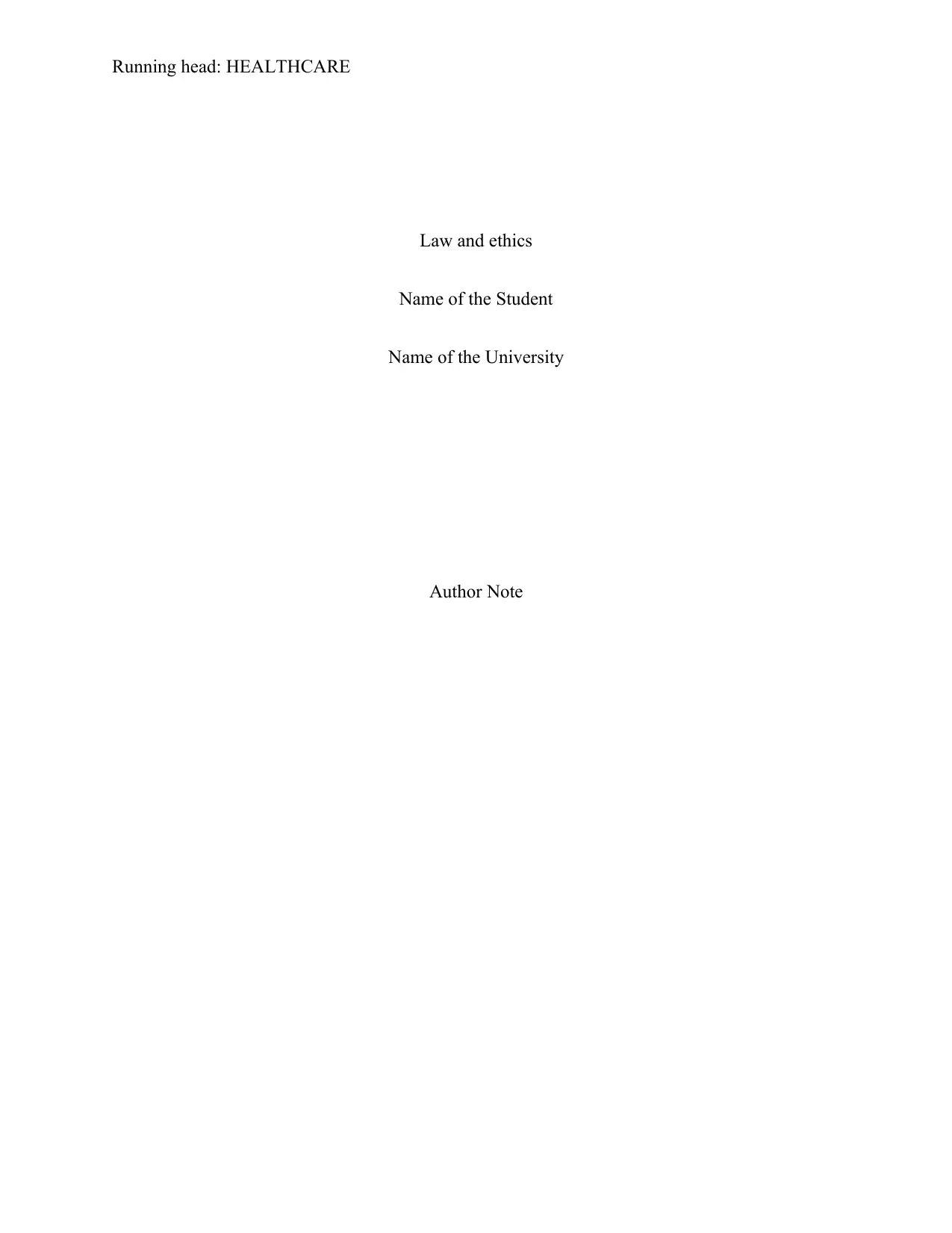
Running head: HEALTHCARE
Law and ethics
Name of the Student
Name of the University
Author Note
Law and ethics
Name of the Student
Name of the University
Author Note
Paraphrase This Document
Need a fresh take? Get an instant paraphrase of this document with our AI Paraphraser
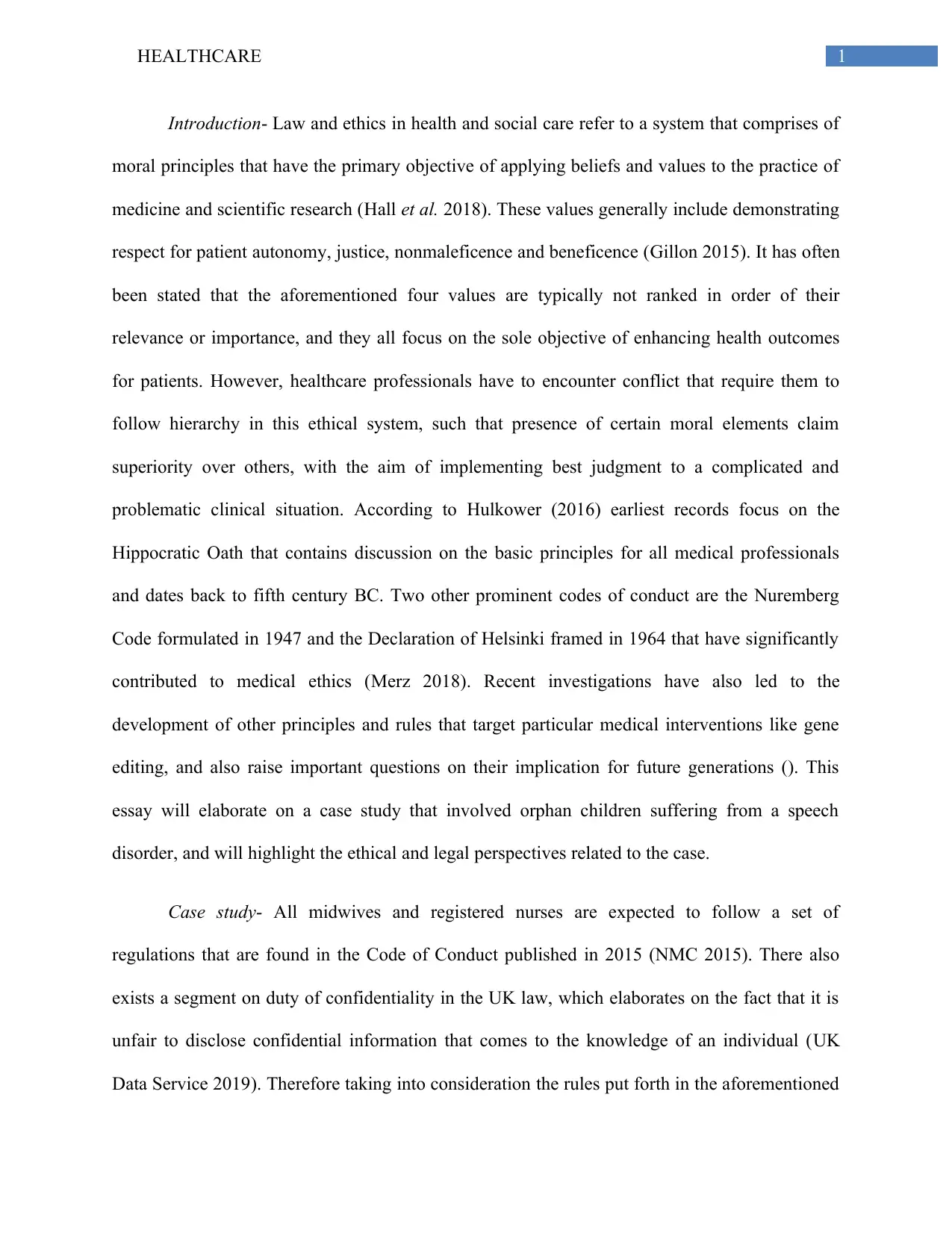
1HEALTHCARE
Introduction- Law and ethics in health and social care refer to a system that comprises of
moral principles that have the primary objective of applying beliefs and values to the practice of
medicine and scientific research (Hall et al. 2018). These values generally include demonstrating
respect for patient autonomy, justice, nonmaleficence and beneficence (Gillon 2015). It has often
been stated that the aforementioned four values are typically not ranked in order of their
relevance or importance, and they all focus on the sole objective of enhancing health outcomes
for patients. However, healthcare professionals have to encounter conflict that require them to
follow hierarchy in this ethical system, such that presence of certain moral elements claim
superiority over others, with the aim of implementing best judgment to a complicated and
problematic clinical situation. According to Hulkower (2016) earliest records focus on the
Hippocratic Oath that contains discussion on the basic principles for all medical professionals
and dates back to fifth century BC. Two other prominent codes of conduct are the Nuremberg
Code formulated in 1947 and the Declaration of Helsinki framed in 1964 that have significantly
contributed to medical ethics (Merz 2018). Recent investigations have also led to the
development of other principles and rules that target particular medical interventions like gene
editing, and also raise important questions on their implication for future generations (). This
essay will elaborate on a case study that involved orphan children suffering from a speech
disorder, and will highlight the ethical and legal perspectives related to the case.
Case study- All midwives and registered nurses are expected to follow a set of
regulations that are found in the Code of Conduct published in 2015 (NMC 2015). There also
exists a segment on duty of confidentiality in the UK law, which elaborates on the fact that it is
unfair to disclose confidential information that comes to the knowledge of an individual (UK
Data Service 2019). Therefore taking into consideration the rules put forth in the aforementioned
Introduction- Law and ethics in health and social care refer to a system that comprises of
moral principles that have the primary objective of applying beliefs and values to the practice of
medicine and scientific research (Hall et al. 2018). These values generally include demonstrating
respect for patient autonomy, justice, nonmaleficence and beneficence (Gillon 2015). It has often
been stated that the aforementioned four values are typically not ranked in order of their
relevance or importance, and they all focus on the sole objective of enhancing health outcomes
for patients. However, healthcare professionals have to encounter conflict that require them to
follow hierarchy in this ethical system, such that presence of certain moral elements claim
superiority over others, with the aim of implementing best judgment to a complicated and
problematic clinical situation. According to Hulkower (2016) earliest records focus on the
Hippocratic Oath that contains discussion on the basic principles for all medical professionals
and dates back to fifth century BC. Two other prominent codes of conduct are the Nuremberg
Code formulated in 1947 and the Declaration of Helsinki framed in 1964 that have significantly
contributed to medical ethics (Merz 2018). Recent investigations have also led to the
development of other principles and rules that target particular medical interventions like gene
editing, and also raise important questions on their implication for future generations (). This
essay will elaborate on a case study that involved orphan children suffering from a speech
disorder, and will highlight the ethical and legal perspectives related to the case.
Case study- All midwives and registered nurses are expected to follow a set of
regulations that are found in the Code of Conduct published in 2015 (NMC 2015). There also
exists a segment on duty of confidentiality in the UK law, which elaborates on the fact that it is
unfair to disclose confidential information that comes to the knowledge of an individual (UK
Data Service 2019). Therefore taking into consideration the rules put forth in the aforementioned
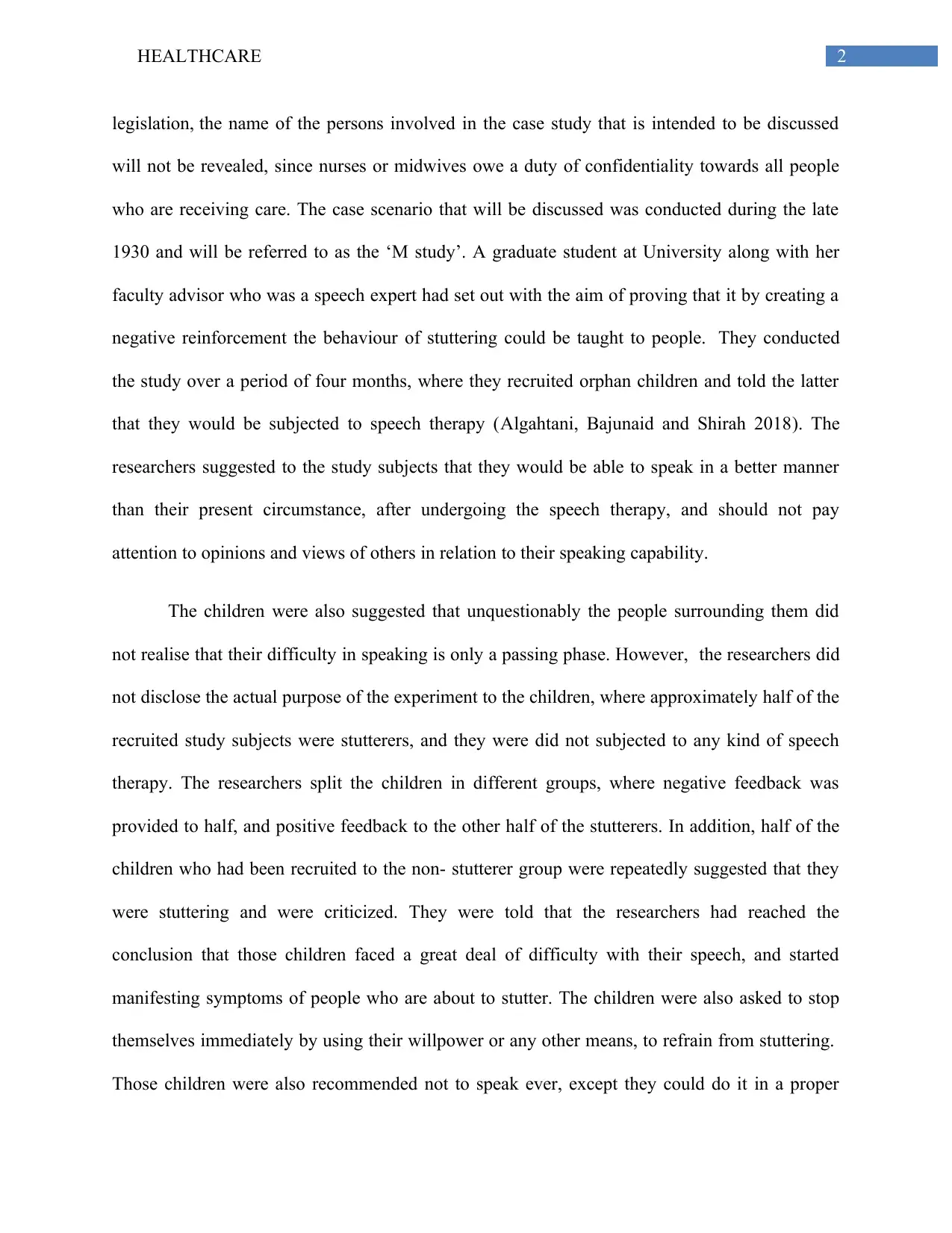
2HEALTHCARE
legislation, the name of the persons involved in the case study that is intended to be discussed
will not be revealed, since nurses or midwives owe a duty of confidentiality towards all people
who are receiving care. The case scenario that will be discussed was conducted during the late
1930 and will be referred to as the ‘M study’. A graduate student at University along with her
faculty advisor who was a speech expert had set out with the aim of proving that it by creating a
negative reinforcement the behaviour of stuttering could be taught to people. They conducted
the study over a period of four months, where they recruited orphan children and told the latter
that they would be subjected to speech therapy (Algahtani, Bajunaid and Shirah 2018). The
researchers suggested to the study subjects that they would be able to speak in a better manner
than their present circumstance, after undergoing the speech therapy, and should not pay
attention to opinions and views of others in relation to their speaking capability.
The children were also suggested that unquestionably the people surrounding them did
not realise that their difficulty in speaking is only a passing phase. However, the researchers did
not disclose the actual purpose of the experiment to the children, where approximately half of the
recruited study subjects were stutterers, and they were did not subjected to any kind of speech
therapy. The researchers split the children in different groups, where negative feedback was
provided to half, and positive feedback to the other half of the stutterers. In addition, half of the
children who had been recruited to the non- stutterer group were repeatedly suggested that they
were stuttering and were criticized. They were told that the researchers had reached the
conclusion that those children faced a great deal of difficulty with their speech, and started
manifesting symptoms of people who are about to stutter. The children were also asked to stop
themselves immediately by using their willpower or any other means, to refrain from stuttering.
Those children were also recommended not to speak ever, except they could do it in a proper
legislation, the name of the persons involved in the case study that is intended to be discussed
will not be revealed, since nurses or midwives owe a duty of confidentiality towards all people
who are receiving care. The case scenario that will be discussed was conducted during the late
1930 and will be referred to as the ‘M study’. A graduate student at University along with her
faculty advisor who was a speech expert had set out with the aim of proving that it by creating a
negative reinforcement the behaviour of stuttering could be taught to people. They conducted
the study over a period of four months, where they recruited orphan children and told the latter
that they would be subjected to speech therapy (Algahtani, Bajunaid and Shirah 2018). The
researchers suggested to the study subjects that they would be able to speak in a better manner
than their present circumstance, after undergoing the speech therapy, and should not pay
attention to opinions and views of others in relation to their speaking capability.
The children were also suggested that unquestionably the people surrounding them did
not realise that their difficulty in speaking is only a passing phase. However, the researchers did
not disclose the actual purpose of the experiment to the children, where approximately half of the
recruited study subjects were stutterers, and they were did not subjected to any kind of speech
therapy. The researchers split the children in different groups, where negative feedback was
provided to half, and positive feedback to the other half of the stutterers. In addition, half of the
children who had been recruited to the non- stutterer group were repeatedly suggested that they
were stuttering and were criticized. They were told that the researchers had reached the
conclusion that those children faced a great deal of difficulty with their speech, and started
manifesting symptoms of people who are about to stutter. The children were also asked to stop
themselves immediately by using their willpower or any other means, to refrain from stuttering.
Those children were also recommended not to speak ever, except they could do it in a proper
⊘ This is a preview!⊘
Do you want full access?
Subscribe today to unlock all pages.

Trusted by 1+ million students worldwide
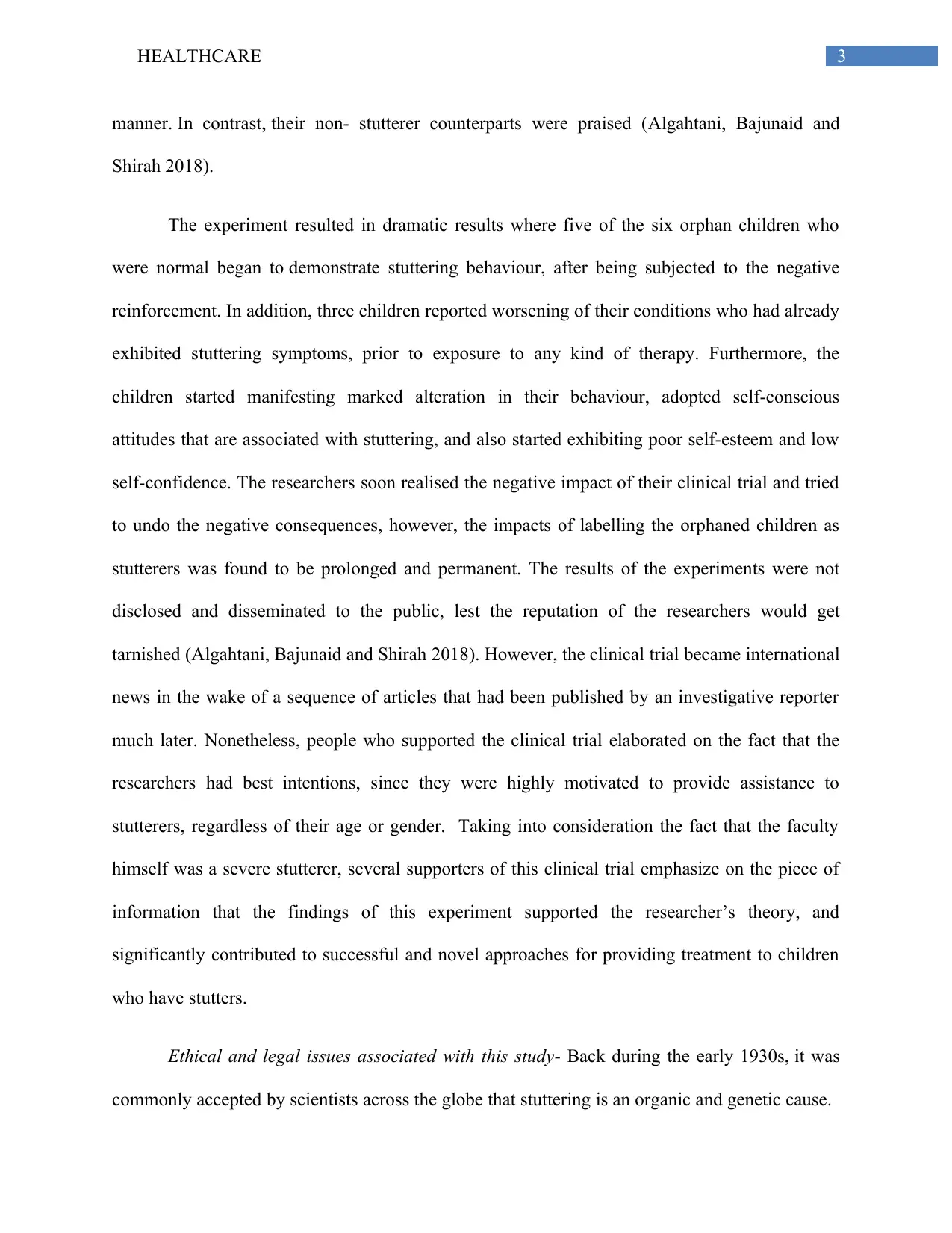
3HEALTHCARE
manner. In contrast, their non- stutterer counterparts were praised (Algahtani, Bajunaid and
Shirah 2018).
The experiment resulted in dramatic results where five of the six orphan children who
were normal began to demonstrate stuttering behaviour, after being subjected to the negative
reinforcement. In addition, three children reported worsening of their conditions who had already
exhibited stuttering symptoms, prior to exposure to any kind of therapy. Furthermore, the
children started manifesting marked alteration in their behaviour, adopted self-conscious
attitudes that are associated with stuttering, and also started exhibiting poor self-esteem and low
self-confidence. The researchers soon realised the negative impact of their clinical trial and tried
to undo the negative consequences, however, the impacts of labelling the orphaned children as
stutterers was found to be prolonged and permanent. The results of the experiments were not
disclosed and disseminated to the public, lest the reputation of the researchers would get
tarnished (Algahtani, Bajunaid and Shirah 2018). However, the clinical trial became international
news in the wake of a sequence of articles that had been published by an investigative reporter
much later. Nonetheless, people who supported the clinical trial elaborated on the fact that the
researchers had best intentions, since they were highly motivated to provide assistance to
stutterers, regardless of their age or gender. Taking into consideration the fact that the faculty
himself was a severe stutterer, several supporters of this clinical trial emphasize on the piece of
information that the findings of this experiment supported the researcher’s theory, and
significantly contributed to successful and novel approaches for providing treatment to children
who have stutters.
Ethical and legal issues associated with this study- Back during the early 1930s, it was
commonly accepted by scientists across the globe that stuttering is an organic and genetic cause.
manner. In contrast, their non- stutterer counterparts were praised (Algahtani, Bajunaid and
Shirah 2018).
The experiment resulted in dramatic results where five of the six orphan children who
were normal began to demonstrate stuttering behaviour, after being subjected to the negative
reinforcement. In addition, three children reported worsening of their conditions who had already
exhibited stuttering symptoms, prior to exposure to any kind of therapy. Furthermore, the
children started manifesting marked alteration in their behaviour, adopted self-conscious
attitudes that are associated with stuttering, and also started exhibiting poor self-esteem and low
self-confidence. The researchers soon realised the negative impact of their clinical trial and tried
to undo the negative consequences, however, the impacts of labelling the orphaned children as
stutterers was found to be prolonged and permanent. The results of the experiments were not
disclosed and disseminated to the public, lest the reputation of the researchers would get
tarnished (Algahtani, Bajunaid and Shirah 2018). However, the clinical trial became international
news in the wake of a sequence of articles that had been published by an investigative reporter
much later. Nonetheless, people who supported the clinical trial elaborated on the fact that the
researchers had best intentions, since they were highly motivated to provide assistance to
stutterers, regardless of their age or gender. Taking into consideration the fact that the faculty
himself was a severe stutterer, several supporters of this clinical trial emphasize on the piece of
information that the findings of this experiment supported the researcher’s theory, and
significantly contributed to successful and novel approaches for providing treatment to children
who have stutters.
Ethical and legal issues associated with this study- Back during the early 1930s, it was
commonly accepted by scientists across the globe that stuttering is an organic and genetic cause.
Paraphrase This Document
Need a fresh take? Get an instant paraphrase of this document with our AI Paraphraser
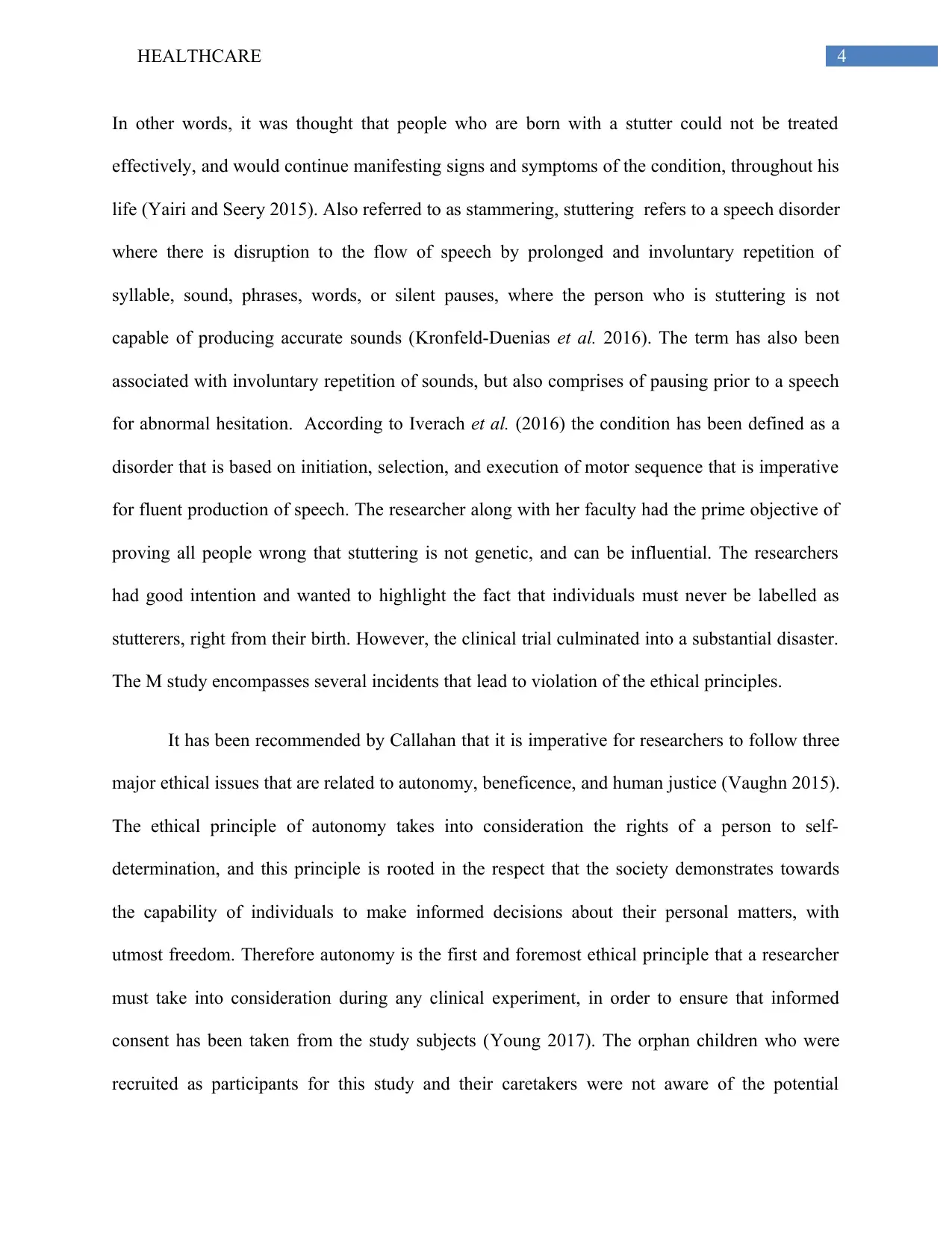
4HEALTHCARE
In other words, it was thought that people who are born with a stutter could not be treated
effectively, and would continue manifesting signs and symptoms of the condition, throughout his
life (Yairi and Seery 2015). Also referred to as stammering, stuttering refers to a speech disorder
where there is disruption to the flow of speech by prolonged and involuntary repetition of
syllable, sound, phrases, words, or silent pauses, where the person who is stuttering is not
capable of producing accurate sounds (Kronfeld-Duenias et al. 2016). The term has also been
associated with involuntary repetition of sounds, but also comprises of pausing prior to a speech
for abnormal hesitation. According to Iverach et al. (2016) the condition has been defined as a
disorder that is based on initiation, selection, and execution of motor sequence that is imperative
for fluent production of speech. The researcher along with her faculty had the prime objective of
proving all people wrong that stuttering is not genetic, and can be influential. The researchers
had good intention and wanted to highlight the fact that individuals must never be labelled as
stutterers, right from their birth. However, the clinical trial culminated into a substantial disaster.
The M study encompasses several incidents that lead to violation of the ethical principles.
It has been recommended by Callahan that it is imperative for researchers to follow three
major ethical issues that are related to autonomy, beneficence, and human justice (Vaughn 2015).
The ethical principle of autonomy takes into consideration the rights of a person to self-
determination, and this principle is rooted in the respect that the society demonstrates towards
the capability of individuals to make informed decisions about their personal matters, with
utmost freedom. Therefore autonomy is the first and foremost ethical principle that a researcher
must take into consideration during any clinical experiment, in order to ensure that informed
consent has been taken from the study subjects (Young 2017). The orphan children who were
recruited as participants for this study and their caretakers were not aware of the potential
In other words, it was thought that people who are born with a stutter could not be treated
effectively, and would continue manifesting signs and symptoms of the condition, throughout his
life (Yairi and Seery 2015). Also referred to as stammering, stuttering refers to a speech disorder
where there is disruption to the flow of speech by prolonged and involuntary repetition of
syllable, sound, phrases, words, or silent pauses, where the person who is stuttering is not
capable of producing accurate sounds (Kronfeld-Duenias et al. 2016). The term has also been
associated with involuntary repetition of sounds, but also comprises of pausing prior to a speech
for abnormal hesitation. According to Iverach et al. (2016) the condition has been defined as a
disorder that is based on initiation, selection, and execution of motor sequence that is imperative
for fluent production of speech. The researcher along with her faculty had the prime objective of
proving all people wrong that stuttering is not genetic, and can be influential. The researchers
had good intention and wanted to highlight the fact that individuals must never be labelled as
stutterers, right from their birth. However, the clinical trial culminated into a substantial disaster.
The M study encompasses several incidents that lead to violation of the ethical principles.
It has been recommended by Callahan that it is imperative for researchers to follow three
major ethical issues that are related to autonomy, beneficence, and human justice (Vaughn 2015).
The ethical principle of autonomy takes into consideration the rights of a person to self-
determination, and this principle is rooted in the respect that the society demonstrates towards
the capability of individuals to make informed decisions about their personal matters, with
utmost freedom. Therefore autonomy is the first and foremost ethical principle that a researcher
must take into consideration during any clinical experiment, in order to ensure that informed
consent has been taken from the study subjects (Young 2017). The orphan children who were
recruited as participants for this study and their caretakers were not aware of the potential
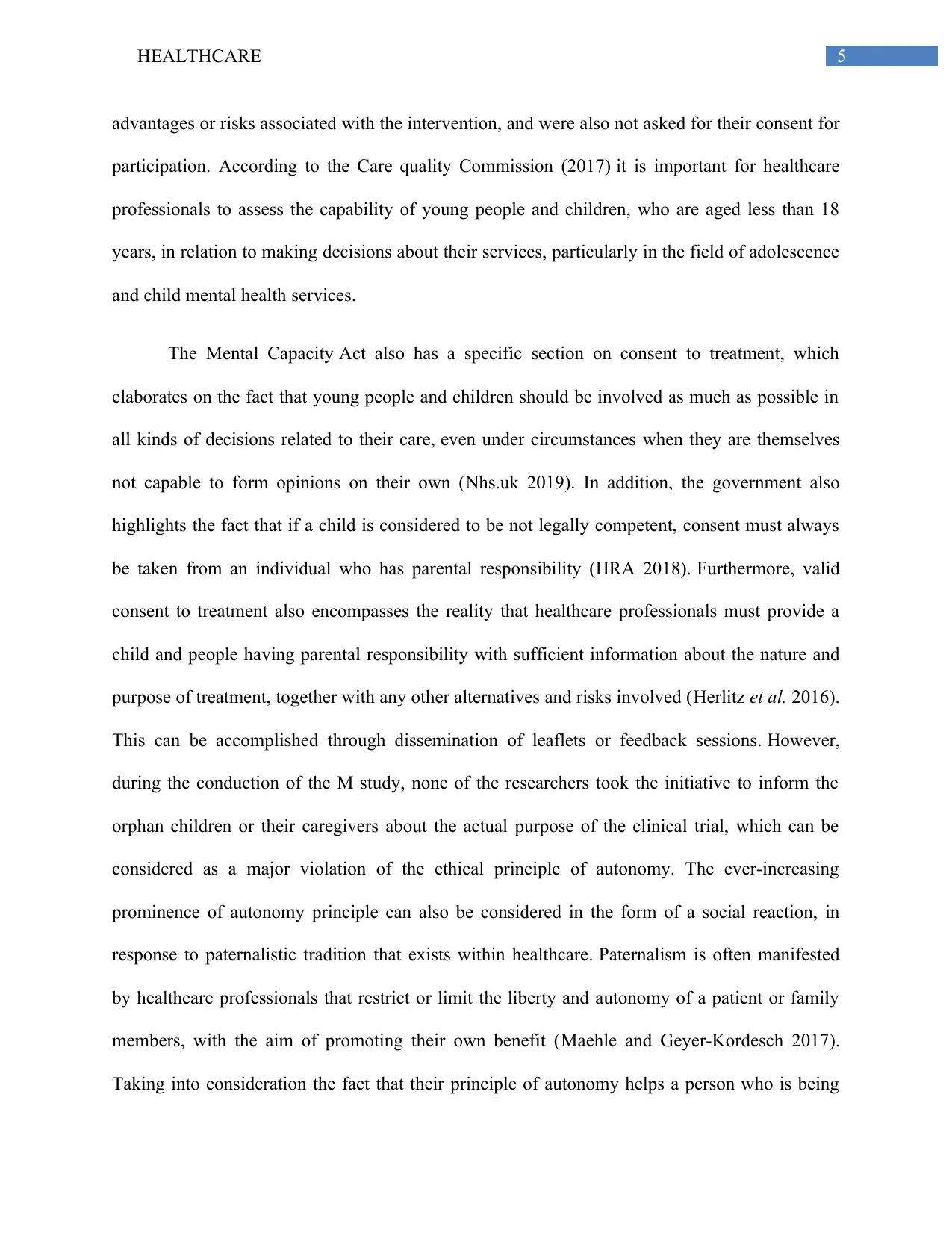
5HEALTHCARE
advantages or risks associated with the intervention, and were also not asked for their consent for
participation. According to the Care quality Commission (2017) it is important for healthcare
professionals to assess the capability of young people and children, who are aged less than 18
years, in relation to making decisions about their services, particularly in the field of adolescence
and child mental health services.
The Mental Capacity Act also has a specific section on consent to treatment, which
elaborates on the fact that young people and children should be involved as much as possible in
all kinds of decisions related to their care, even under circumstances when they are themselves
not capable to form opinions on their own (Nhs.uk 2019). In addition, the government also
highlights the fact that if a child is considered to be not legally competent, consent must always
be taken from an individual who has parental responsibility (HRA 2018). Furthermore, valid
consent to treatment also encompasses the reality that healthcare professionals must provide a
child and people having parental responsibility with sufficient information about the nature and
purpose of treatment, together with any other alternatives and risks involved (Herlitz et al. 2016).
This can be accomplished through dissemination of leaflets or feedback sessions. However,
during the conduction of the M study, none of the researchers took the initiative to inform the
orphan children or their caregivers about the actual purpose of the clinical trial, which can be
considered as a major violation of the ethical principle of autonomy. The ever-increasing
prominence of autonomy principle can also be considered in the form of a social reaction, in
response to paternalistic tradition that exists within healthcare. Paternalism is often manifested
by healthcare professionals that restrict or limit the liberty and autonomy of a patient or family
members, with the aim of promoting their own benefit (Maehle and Geyer-Kordesch 2017).
Taking into consideration the fact that their principle of autonomy helps a person who is being
advantages or risks associated with the intervention, and were also not asked for their consent for
participation. According to the Care quality Commission (2017) it is important for healthcare
professionals to assess the capability of young people and children, who are aged less than 18
years, in relation to making decisions about their services, particularly in the field of adolescence
and child mental health services.
The Mental Capacity Act also has a specific section on consent to treatment, which
elaborates on the fact that young people and children should be involved as much as possible in
all kinds of decisions related to their care, even under circumstances when they are themselves
not capable to form opinions on their own (Nhs.uk 2019). In addition, the government also
highlights the fact that if a child is considered to be not legally competent, consent must always
be taken from an individual who has parental responsibility (HRA 2018). Furthermore, valid
consent to treatment also encompasses the reality that healthcare professionals must provide a
child and people having parental responsibility with sufficient information about the nature and
purpose of treatment, together with any other alternatives and risks involved (Herlitz et al. 2016).
This can be accomplished through dissemination of leaflets or feedback sessions. However,
during the conduction of the M study, none of the researchers took the initiative to inform the
orphan children or their caregivers about the actual purpose of the clinical trial, which can be
considered as a major violation of the ethical principle of autonomy. The ever-increasing
prominence of autonomy principle can also be considered in the form of a social reaction, in
response to paternalistic tradition that exists within healthcare. Paternalism is often manifested
by healthcare professionals that restrict or limit the liberty and autonomy of a patient or family
members, with the aim of promoting their own benefit (Maehle and Geyer-Kordesch 2017).
Taking into consideration the fact that their principle of autonomy helps a person who is being
⊘ This is a preview!⊘
Do you want full access?
Subscribe today to unlock all pages.

Trusted by 1+ million students worldwide
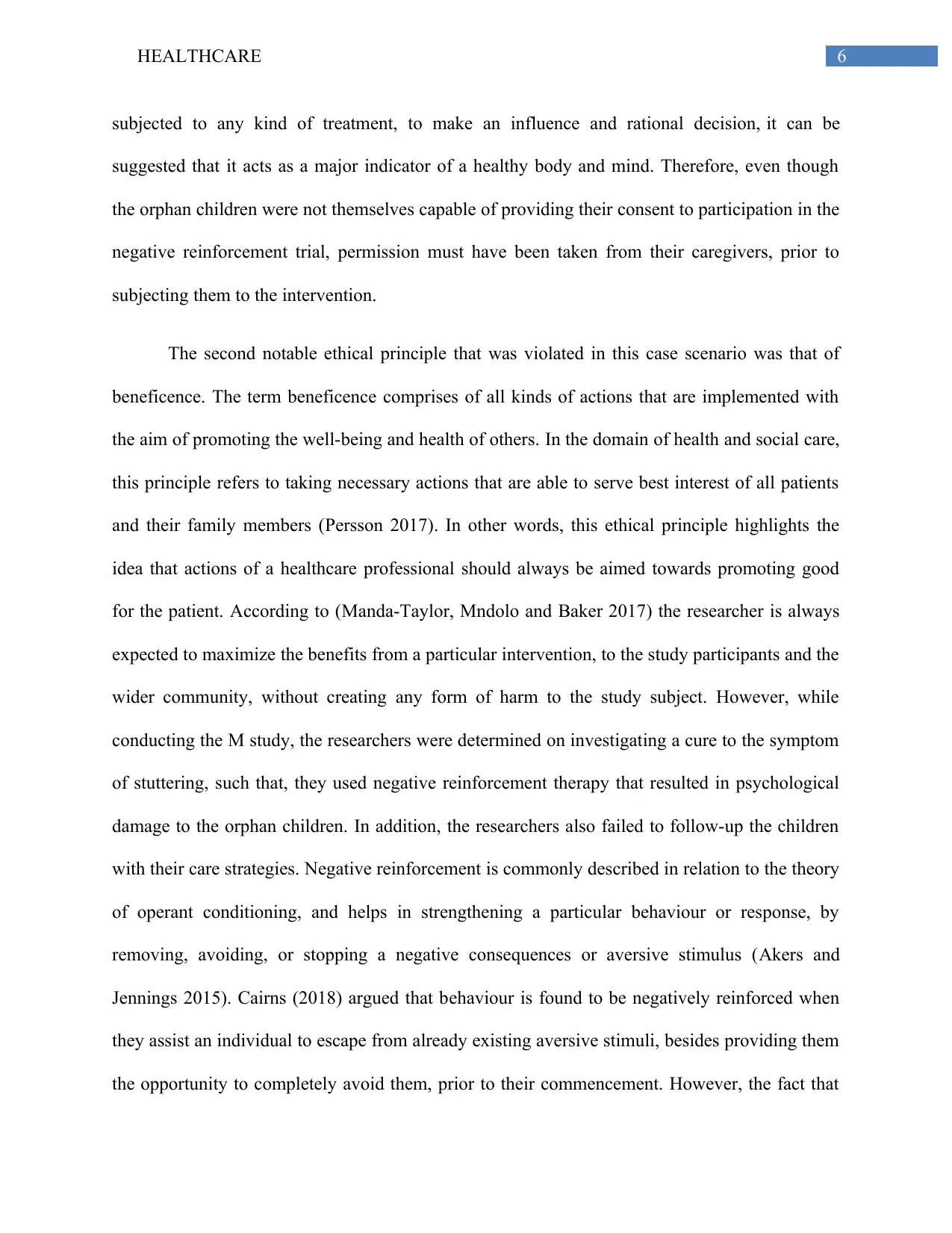
6HEALTHCARE
subjected to any kind of treatment, to make an influence and rational decision, it can be
suggested that it acts as a major indicator of a healthy body and mind. Therefore, even though
the orphan children were not themselves capable of providing their consent to participation in the
negative reinforcement trial, permission must have been taken from their caregivers, prior to
subjecting them to the intervention.
The second notable ethical principle that was violated in this case scenario was that of
beneficence. The term beneficence comprises of all kinds of actions that are implemented with
the aim of promoting the well-being and health of others. In the domain of health and social care,
this principle refers to taking necessary actions that are able to serve best interest of all patients
and their family members (Persson 2017). In other words, this ethical principle highlights the
idea that actions of a healthcare professional should always be aimed towards promoting good
for the patient. According to (Manda-Taylor, Mndolo and Baker 2017) the researcher is always
expected to maximize the benefits from a particular intervention, to the study participants and the
wider community, without creating any form of harm to the study subject. However, while
conducting the M study, the researchers were determined on investigating a cure to the symptom
of stuttering, such that, they used negative reinforcement therapy that resulted in psychological
damage to the orphan children. In addition, the researchers also failed to follow-up the children
with their care strategies. Negative reinforcement is commonly described in relation to the theory
of operant conditioning, and helps in strengthening a particular behaviour or response, by
removing, avoiding, or stopping a negative consequences or aversive stimulus (Akers and
Jennings 2015). Cairns (2018) argued that behaviour is found to be negatively reinforced when
they assist an individual to escape from already existing aversive stimuli, besides providing them
the opportunity to completely avoid them, prior to their commencement. However, the fact that
subjected to any kind of treatment, to make an influence and rational decision, it can be
suggested that it acts as a major indicator of a healthy body and mind. Therefore, even though
the orphan children were not themselves capable of providing their consent to participation in the
negative reinforcement trial, permission must have been taken from their caregivers, prior to
subjecting them to the intervention.
The second notable ethical principle that was violated in this case scenario was that of
beneficence. The term beneficence comprises of all kinds of actions that are implemented with
the aim of promoting the well-being and health of others. In the domain of health and social care,
this principle refers to taking necessary actions that are able to serve best interest of all patients
and their family members (Persson 2017). In other words, this ethical principle highlights the
idea that actions of a healthcare professional should always be aimed towards promoting good
for the patient. According to (Manda-Taylor, Mndolo and Baker 2017) the researcher is always
expected to maximize the benefits from a particular intervention, to the study participants and the
wider community, without creating any form of harm to the study subject. However, while
conducting the M study, the researchers were determined on investigating a cure to the symptom
of stuttering, such that, they used negative reinforcement therapy that resulted in psychological
damage to the orphan children. In addition, the researchers also failed to follow-up the children
with their care strategies. Negative reinforcement is commonly described in relation to the theory
of operant conditioning, and helps in strengthening a particular behaviour or response, by
removing, avoiding, or stopping a negative consequences or aversive stimulus (Akers and
Jennings 2015). Cairns (2018) argued that behaviour is found to be negatively reinforced when
they assist an individual to escape from already existing aversive stimuli, besides providing them
the opportunity to completely avoid them, prior to their commencement. However, the fact that
Paraphrase This Document
Need a fresh take? Get an instant paraphrase of this document with our AI Paraphraser
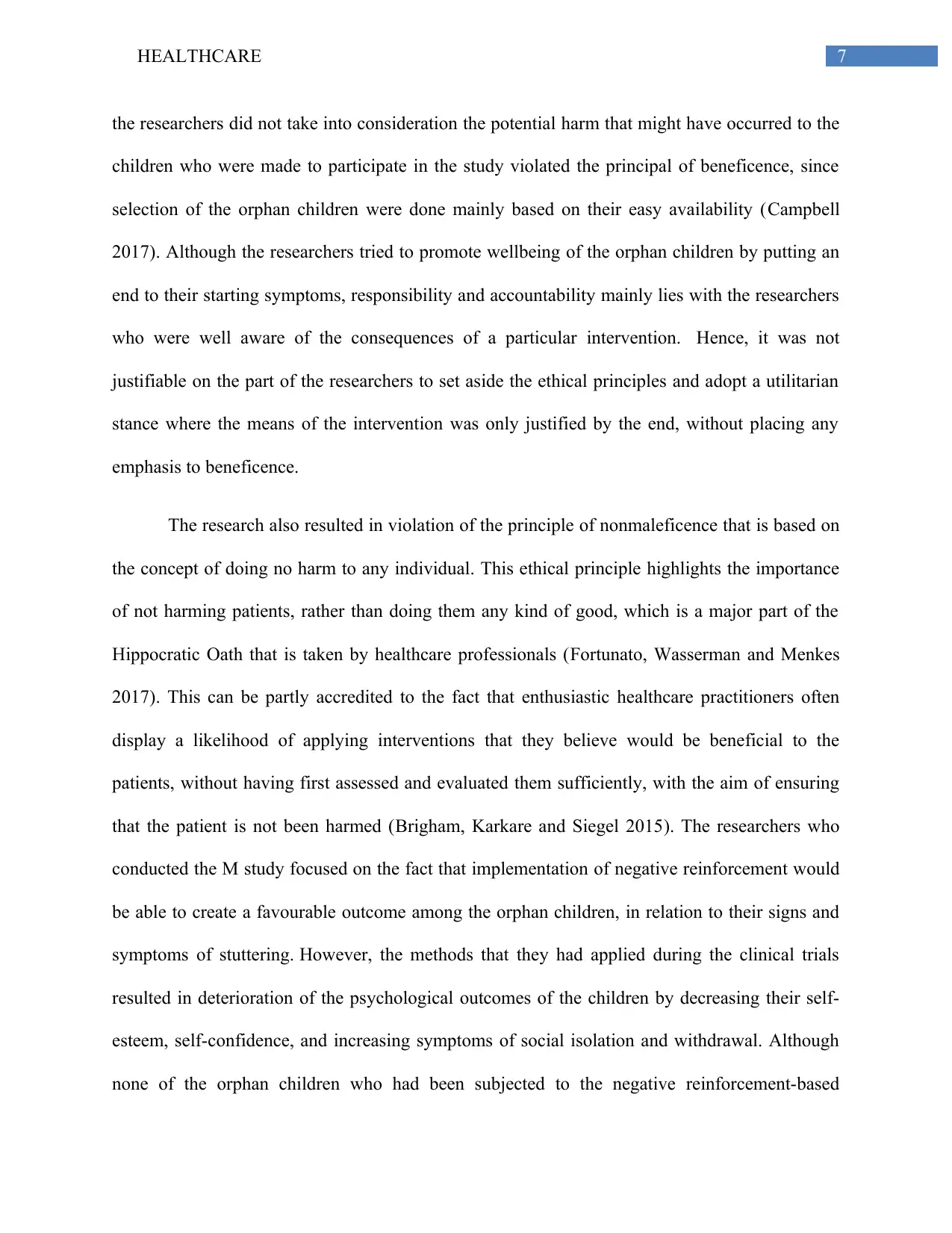
7HEALTHCARE
the researchers did not take into consideration the potential harm that might have occurred to the
children who were made to participate in the study violated the principal of beneficence, since
selection of the orphan children were done mainly based on their easy availability (Campbell
2017). Although the researchers tried to promote wellbeing of the orphan children by putting an
end to their starting symptoms, responsibility and accountability mainly lies with the researchers
who were well aware of the consequences of a particular intervention. Hence, it was not
justifiable on the part of the researchers to set aside the ethical principles and adopt a utilitarian
stance where the means of the intervention was only justified by the end, without placing any
emphasis to beneficence.
The research also resulted in violation of the principle of nonmaleficence that is based on
the concept of doing no harm to any individual. This ethical principle highlights the importance
of not harming patients, rather than doing them any kind of good, which is a major part of the
Hippocratic Oath that is taken by healthcare professionals (Fortunato, Wasserman and Menkes
2017). This can be partly accredited to the fact that enthusiastic healthcare practitioners often
display a likelihood of applying interventions that they believe would be beneficial to the
patients, without having first assessed and evaluated them sufficiently, with the aim of ensuring
that the patient is not been harmed (Brigham, Karkare and Siegel 2015). The researchers who
conducted the M study focused on the fact that implementation of negative reinforcement would
be able to create a favourable outcome among the orphan children, in relation to their signs and
symptoms of stuttering. However, the methods that they had applied during the clinical trials
resulted in deterioration of the psychological outcomes of the children by decreasing their self-
esteem, self-confidence, and increasing symptoms of social isolation and withdrawal. Although
none of the orphan children who had been subjected to the negative reinforcement-based
the researchers did not take into consideration the potential harm that might have occurred to the
children who were made to participate in the study violated the principal of beneficence, since
selection of the orphan children were done mainly based on their easy availability (Campbell
2017). Although the researchers tried to promote wellbeing of the orphan children by putting an
end to their starting symptoms, responsibility and accountability mainly lies with the researchers
who were well aware of the consequences of a particular intervention. Hence, it was not
justifiable on the part of the researchers to set aside the ethical principles and adopt a utilitarian
stance where the means of the intervention was only justified by the end, without placing any
emphasis to beneficence.
The research also resulted in violation of the principle of nonmaleficence that is based on
the concept of doing no harm to any individual. This ethical principle highlights the importance
of not harming patients, rather than doing them any kind of good, which is a major part of the
Hippocratic Oath that is taken by healthcare professionals (Fortunato, Wasserman and Menkes
2017). This can be partly accredited to the fact that enthusiastic healthcare practitioners often
display a likelihood of applying interventions that they believe would be beneficial to the
patients, without having first assessed and evaluated them sufficiently, with the aim of ensuring
that the patient is not been harmed (Brigham, Karkare and Siegel 2015). The researchers who
conducted the M study focused on the fact that implementation of negative reinforcement would
be able to create a favourable outcome among the orphan children, in relation to their signs and
symptoms of stuttering. However, the methods that they had applied during the clinical trials
resulted in deterioration of the psychological outcomes of the children by decreasing their self-
esteem, self-confidence, and increasing symptoms of social isolation and withdrawal. Although
none of the orphan children who had been subjected to the negative reinforcement-based
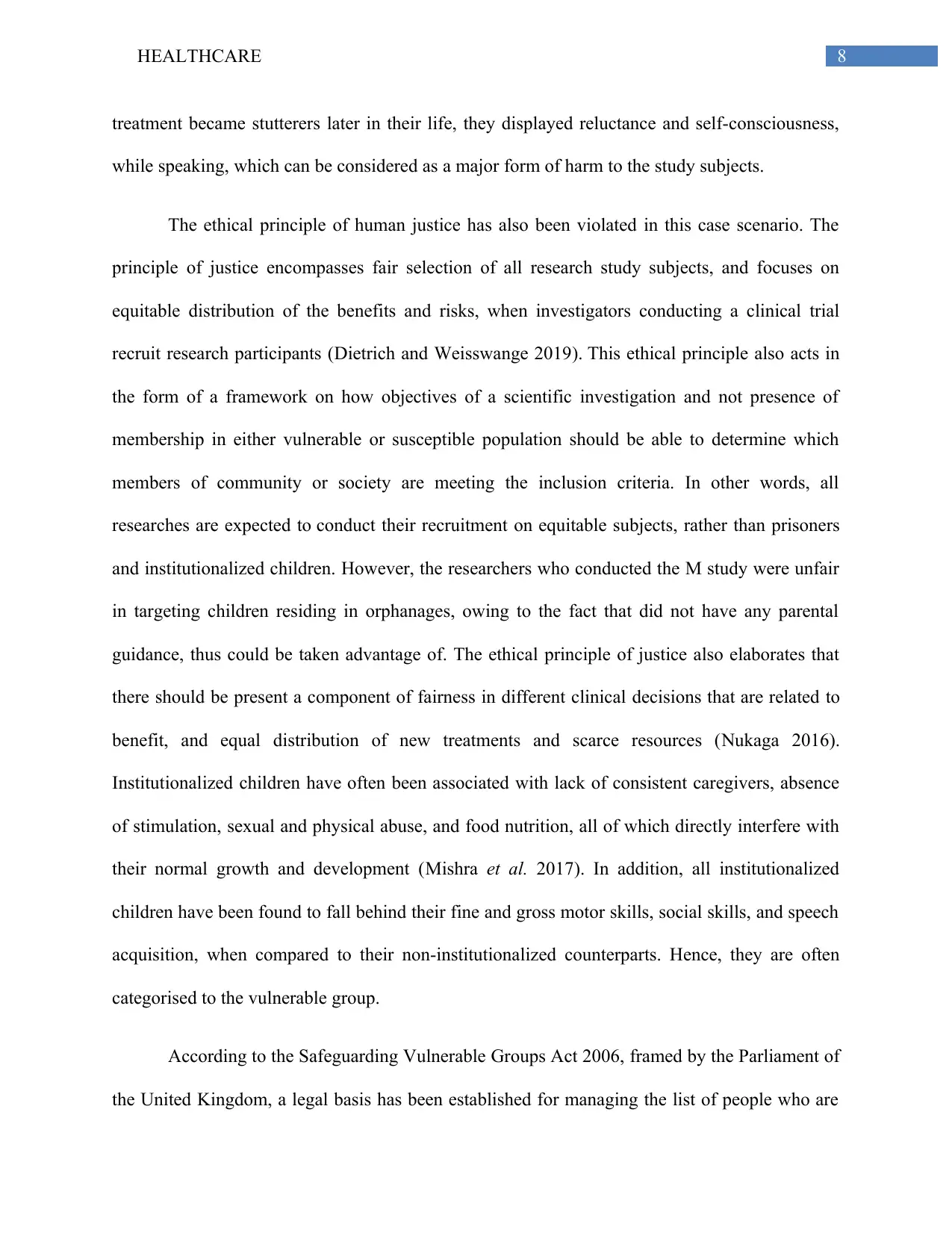
8HEALTHCARE
treatment became stutterers later in their life, they displayed reluctance and self-consciousness,
while speaking, which can be considered as a major form of harm to the study subjects.
The ethical principle of human justice has also been violated in this case scenario. The
principle of justice encompasses fair selection of all research study subjects, and focuses on
equitable distribution of the benefits and risks, when investigators conducting a clinical trial
recruit research participants (Dietrich and Weisswange 2019). This ethical principle also acts in
the form of a framework on how objectives of a scientific investigation and not presence of
membership in either vulnerable or susceptible population should be able to determine which
members of community or society are meeting the inclusion criteria. In other words, all
researches are expected to conduct their recruitment on equitable subjects, rather than prisoners
and institutionalized children. However, the researchers who conducted the M study were unfair
in targeting children residing in orphanages, owing to the fact that did not have any parental
guidance, thus could be taken advantage of. The ethical principle of justice also elaborates that
there should be present a component of fairness in different clinical decisions that are related to
benefit, and equal distribution of new treatments and scarce resources (Nukaga 2016).
Institutionalized children have often been associated with lack of consistent caregivers, absence
of stimulation, sexual and physical abuse, and food nutrition, all of which directly interfere with
their normal growth and development (Mishra et al. 2017). In addition, all institutionalized
children have been found to fall behind their fine and gross motor skills, social skills, and speech
acquisition, when compared to their non-institutionalized counterparts. Hence, they are often
categorised to the vulnerable group.
According to the Safeguarding Vulnerable Groups Act 2006, framed by the Parliament of
the United Kingdom, a legal basis has been established for managing the list of people who are
treatment became stutterers later in their life, they displayed reluctance and self-consciousness,
while speaking, which can be considered as a major form of harm to the study subjects.
The ethical principle of human justice has also been violated in this case scenario. The
principle of justice encompasses fair selection of all research study subjects, and focuses on
equitable distribution of the benefits and risks, when investigators conducting a clinical trial
recruit research participants (Dietrich and Weisswange 2019). This ethical principle also acts in
the form of a framework on how objectives of a scientific investigation and not presence of
membership in either vulnerable or susceptible population should be able to determine which
members of community or society are meeting the inclusion criteria. In other words, all
researches are expected to conduct their recruitment on equitable subjects, rather than prisoners
and institutionalized children. However, the researchers who conducted the M study were unfair
in targeting children residing in orphanages, owing to the fact that did not have any parental
guidance, thus could be taken advantage of. The ethical principle of justice also elaborates that
there should be present a component of fairness in different clinical decisions that are related to
benefit, and equal distribution of new treatments and scarce resources (Nukaga 2016).
Institutionalized children have often been associated with lack of consistent caregivers, absence
of stimulation, sexual and physical abuse, and food nutrition, all of which directly interfere with
their normal growth and development (Mishra et al. 2017). In addition, all institutionalized
children have been found to fall behind their fine and gross motor skills, social skills, and speech
acquisition, when compared to their non-institutionalized counterparts. Hence, they are often
categorised to the vulnerable group.
According to the Safeguarding Vulnerable Groups Act 2006, framed by the Parliament of
the United Kingdom, a legal basis has been established for managing the list of people who are
⊘ This is a preview!⊘
Do you want full access?
Subscribe today to unlock all pages.

Trusted by 1+ million students worldwide
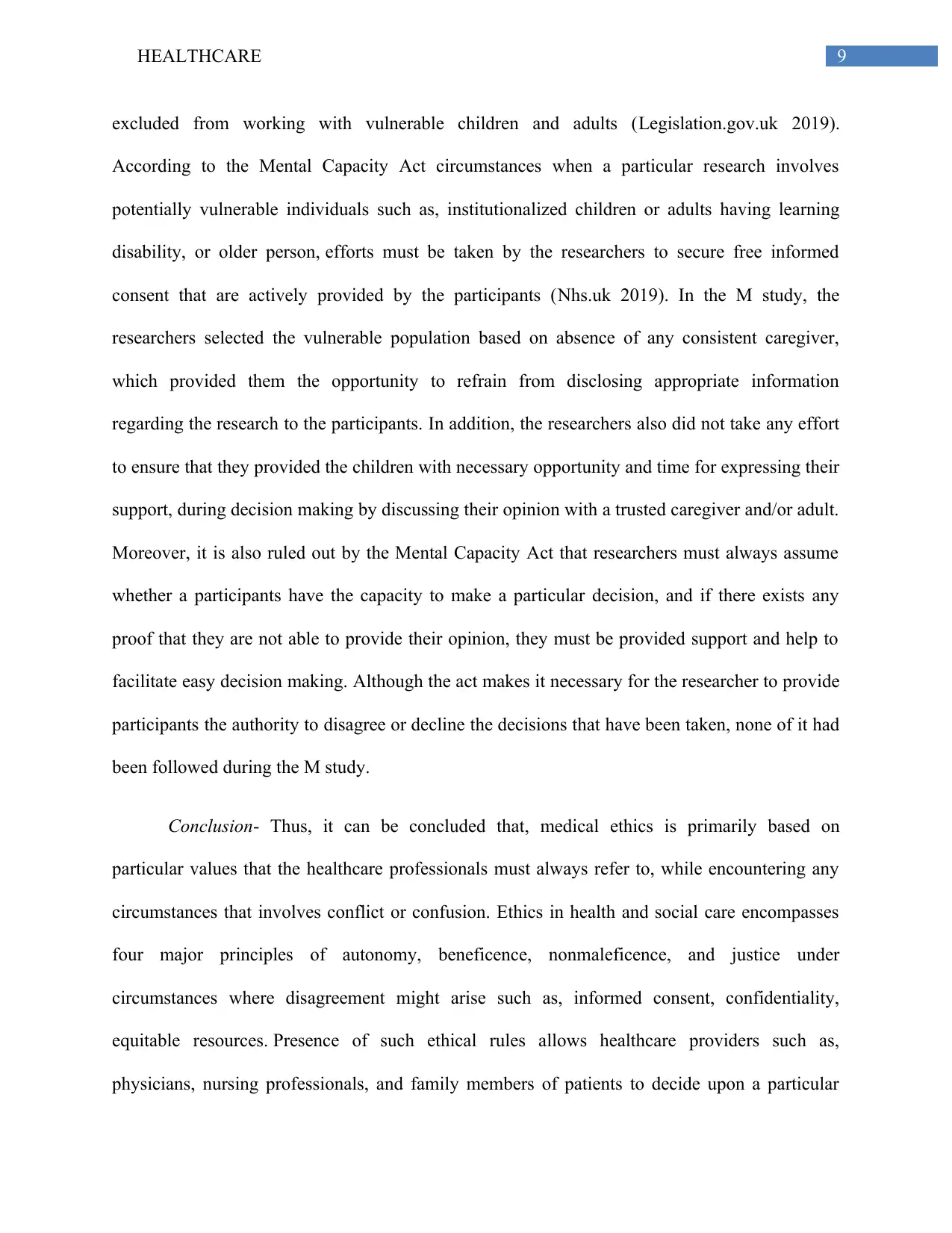
9HEALTHCARE
excluded from working with vulnerable children and adults (Legislation.gov.uk 2019).
According to the Mental Capacity Act circumstances when a particular research involves
potentially vulnerable individuals such as, institutionalized children or adults having learning
disability, or older person, efforts must be taken by the researchers to secure free informed
consent that are actively provided by the participants (Nhs.uk 2019). In the M study, the
researchers selected the vulnerable population based on absence of any consistent caregiver,
which provided them the opportunity to refrain from disclosing appropriate information
regarding the research to the participants. In addition, the researchers also did not take any effort
to ensure that they provided the children with necessary opportunity and time for expressing their
support, during decision making by discussing their opinion with a trusted caregiver and/or adult.
Moreover, it is also ruled out by the Mental Capacity Act that researchers must always assume
whether a participants have the capacity to make a particular decision, and if there exists any
proof that they are not able to provide their opinion, they must be provided support and help to
facilitate easy decision making. Although the act makes it necessary for the researcher to provide
participants the authority to disagree or decline the decisions that have been taken, none of it had
been followed during the M study.
Conclusion- Thus, it can be concluded that, medical ethics is primarily based on
particular values that the healthcare professionals must always refer to, while encountering any
circumstances that involves conflict or confusion. Ethics in health and social care encompasses
four major principles of autonomy, beneficence, nonmaleficence, and justice under
circumstances where disagreement might arise such as, informed consent, confidentiality,
equitable resources. Presence of such ethical rules allows healthcare providers such as,
physicians, nursing professionals, and family members of patients to decide upon a particular
excluded from working with vulnerable children and adults (Legislation.gov.uk 2019).
According to the Mental Capacity Act circumstances when a particular research involves
potentially vulnerable individuals such as, institutionalized children or adults having learning
disability, or older person, efforts must be taken by the researchers to secure free informed
consent that are actively provided by the participants (Nhs.uk 2019). In the M study, the
researchers selected the vulnerable population based on absence of any consistent caregiver,
which provided them the opportunity to refrain from disclosing appropriate information
regarding the research to the participants. In addition, the researchers also did not take any effort
to ensure that they provided the children with necessary opportunity and time for expressing their
support, during decision making by discussing their opinion with a trusted caregiver and/or adult.
Moreover, it is also ruled out by the Mental Capacity Act that researchers must always assume
whether a participants have the capacity to make a particular decision, and if there exists any
proof that they are not able to provide their opinion, they must be provided support and help to
facilitate easy decision making. Although the act makes it necessary for the researcher to provide
participants the authority to disagree or decline the decisions that have been taken, none of it had
been followed during the M study.
Conclusion- Thus, it can be concluded that, medical ethics is primarily based on
particular values that the healthcare professionals must always refer to, while encountering any
circumstances that involves conflict or confusion. Ethics in health and social care encompasses
four major principles of autonomy, beneficence, nonmaleficence, and justice under
circumstances where disagreement might arise such as, informed consent, confidentiality,
equitable resources. Presence of such ethical rules allows healthcare providers such as,
physicians, nursing professionals, and family members of patients to decide upon a particular
Paraphrase This Document
Need a fresh take? Get an instant paraphrase of this document with our AI Paraphraser
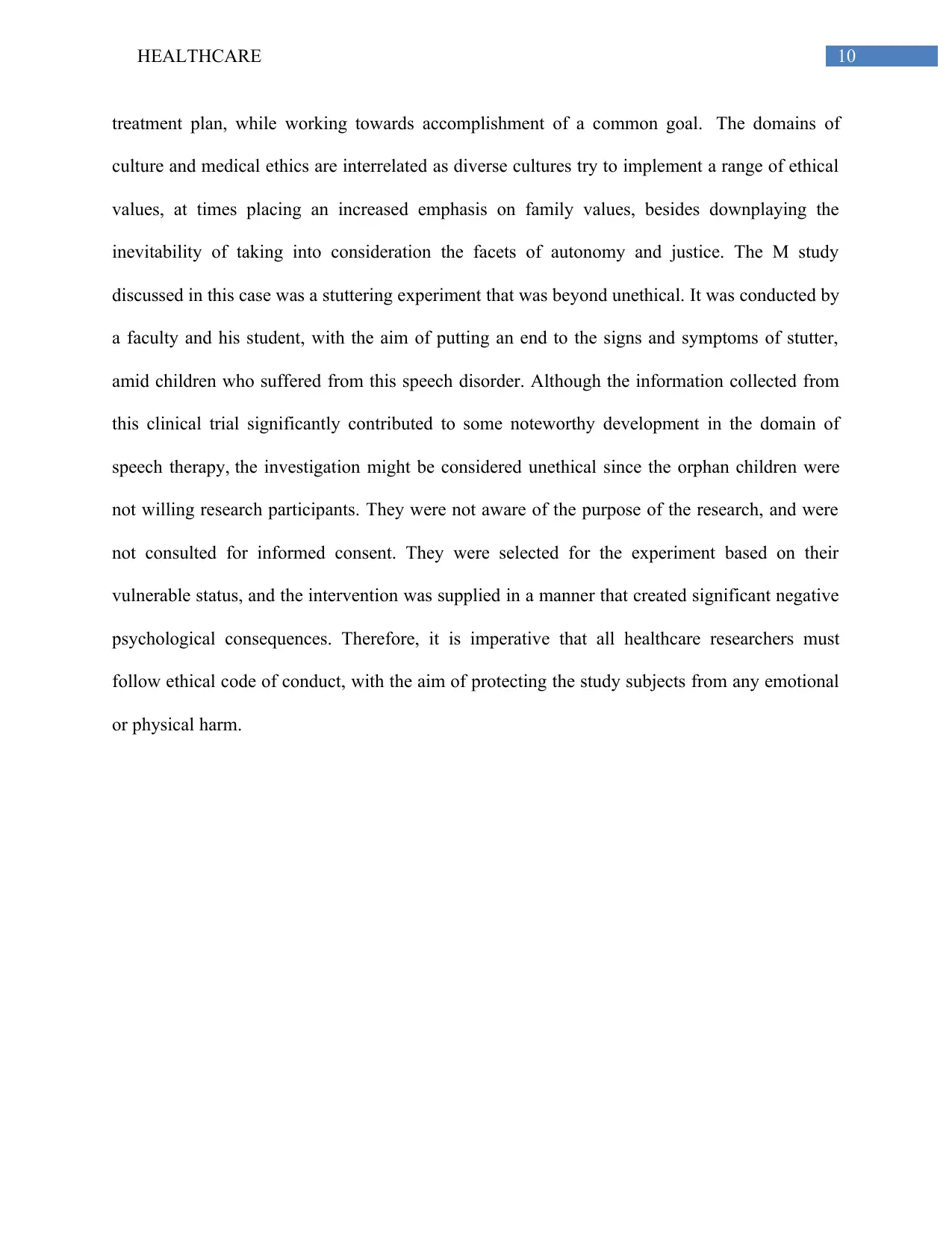
10HEALTHCARE
treatment plan, while working towards accomplishment of a common goal. The domains of
culture and medical ethics are interrelated as diverse cultures try to implement a range of ethical
values, at times placing an increased emphasis on family values, besides downplaying the
inevitability of taking into consideration the facets of autonomy and justice. The M study
discussed in this case was a stuttering experiment that was beyond unethical. It was conducted by
a faculty and his student, with the aim of putting an end to the signs and symptoms of stutter,
amid children who suffered from this speech disorder. Although the information collected from
this clinical trial significantly contributed to some noteworthy development in the domain of
speech therapy, the investigation might be considered unethical since the orphan children were
not willing research participants. They were not aware of the purpose of the research, and were
not consulted for informed consent. They were selected for the experiment based on their
vulnerable status, and the intervention was supplied in a manner that created significant negative
psychological consequences. Therefore, it is imperative that all healthcare researchers must
follow ethical code of conduct, with the aim of protecting the study subjects from any emotional
or physical harm.
treatment plan, while working towards accomplishment of a common goal. The domains of
culture and medical ethics are interrelated as diverse cultures try to implement a range of ethical
values, at times placing an increased emphasis on family values, besides downplaying the
inevitability of taking into consideration the facets of autonomy and justice. The M study
discussed in this case was a stuttering experiment that was beyond unethical. It was conducted by
a faculty and his student, with the aim of putting an end to the signs and symptoms of stutter,
amid children who suffered from this speech disorder. Although the information collected from
this clinical trial significantly contributed to some noteworthy development in the domain of
speech therapy, the investigation might be considered unethical since the orphan children were
not willing research participants. They were not aware of the purpose of the research, and were
not consulted for informed consent. They were selected for the experiment based on their
vulnerable status, and the intervention was supplied in a manner that created significant negative
psychological consequences. Therefore, it is imperative that all healthcare researchers must
follow ethical code of conduct, with the aim of protecting the study subjects from any emotional
or physical harm.
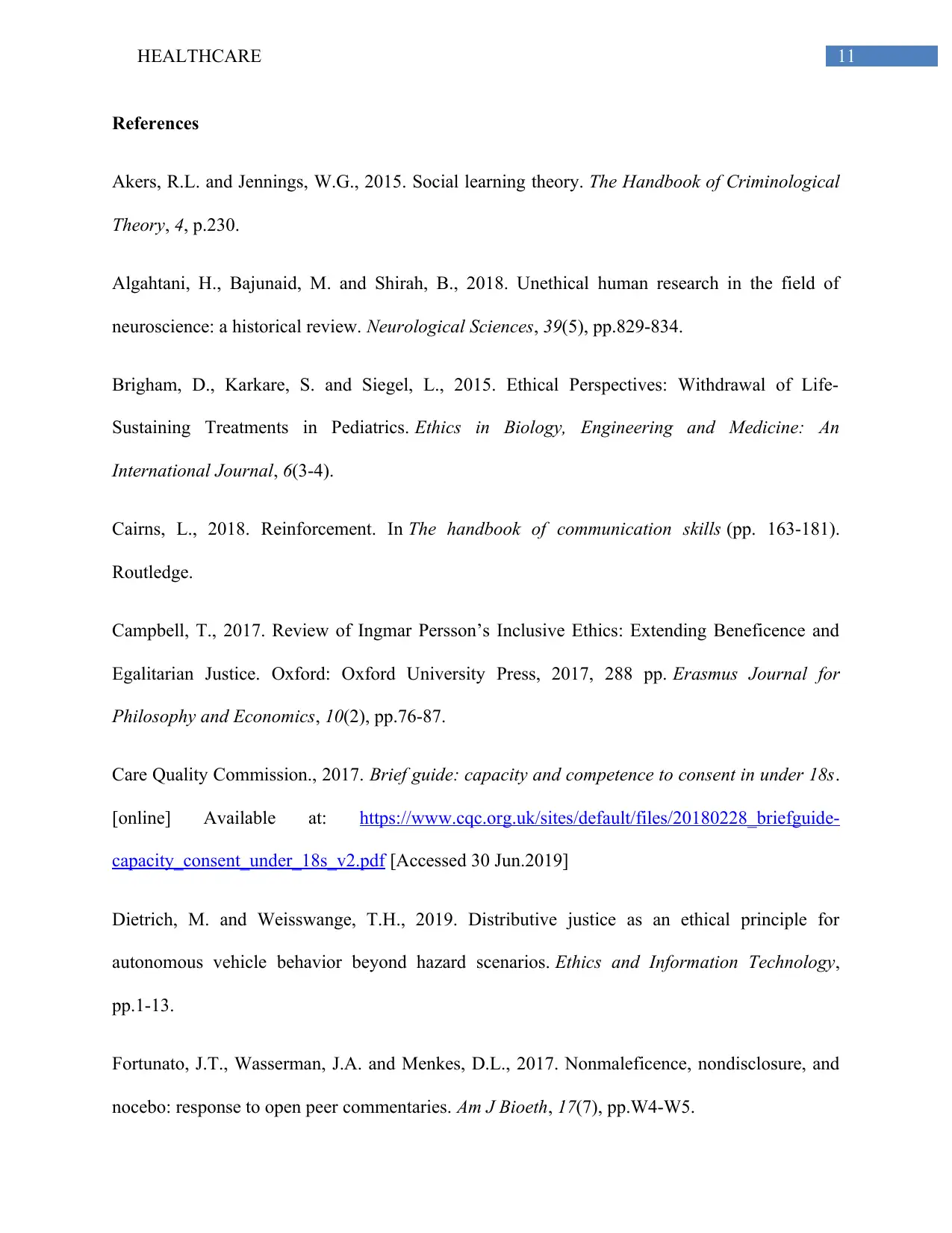
11HEALTHCARE
References
Akers, R.L. and Jennings, W.G., 2015. Social learning theory. The Handbook of Criminological
Theory, 4, p.230.
Algahtani, H., Bajunaid, M. and Shirah, B., 2018. Unethical human research in the field of
neuroscience: a historical review. Neurological Sciences, 39(5), pp.829-834.
Brigham, D., Karkare, S. and Siegel, L., 2015. Ethical Perspectives: Withdrawal of Life-
Sustaining Treatments in Pediatrics. Ethics in Biology, Engineering and Medicine: An
International Journal, 6(3-4).
Cairns, L., 2018. Reinforcement. In The handbook of communication skills (pp. 163-181).
Routledge.
Campbell, T., 2017. Review of Ingmar Persson’s Inclusive Ethics: Extending Beneficence and
Egalitarian Justice. Oxford: Oxford University Press, 2017, 288 pp. Erasmus Journal for
Philosophy and Economics, 10(2), pp.76-87.
Care Quality Commission., 2017. Brief guide: capacity and competence to consent in under 18s.
[online] Available at: https://www.cqc.org.uk/sites/default/files/20180228_briefguide-
capacity_consent_under_18s_v2.pdf [Accessed 30 Jun.2019]
Dietrich, M. and Weisswange, T.H., 2019. Distributive justice as an ethical principle for
autonomous vehicle behavior beyond hazard scenarios. Ethics and Information Technology,
pp.1-13.
Fortunato, J.T., Wasserman, J.A. and Menkes, D.L., 2017. Nonmaleficence, nondisclosure, and
nocebo: response to open peer commentaries. Am J Bioeth, 17(7), pp.W4-W5.
References
Akers, R.L. and Jennings, W.G., 2015. Social learning theory. The Handbook of Criminological
Theory, 4, p.230.
Algahtani, H., Bajunaid, M. and Shirah, B., 2018. Unethical human research in the field of
neuroscience: a historical review. Neurological Sciences, 39(5), pp.829-834.
Brigham, D., Karkare, S. and Siegel, L., 2015. Ethical Perspectives: Withdrawal of Life-
Sustaining Treatments in Pediatrics. Ethics in Biology, Engineering and Medicine: An
International Journal, 6(3-4).
Cairns, L., 2018. Reinforcement. In The handbook of communication skills (pp. 163-181).
Routledge.
Campbell, T., 2017. Review of Ingmar Persson’s Inclusive Ethics: Extending Beneficence and
Egalitarian Justice. Oxford: Oxford University Press, 2017, 288 pp. Erasmus Journal for
Philosophy and Economics, 10(2), pp.76-87.
Care Quality Commission., 2017. Brief guide: capacity and competence to consent in under 18s.
[online] Available at: https://www.cqc.org.uk/sites/default/files/20180228_briefguide-
capacity_consent_under_18s_v2.pdf [Accessed 30 Jun.2019]
Dietrich, M. and Weisswange, T.H., 2019. Distributive justice as an ethical principle for
autonomous vehicle behavior beyond hazard scenarios. Ethics and Information Technology,
pp.1-13.
Fortunato, J.T., Wasserman, J.A. and Menkes, D.L., 2017. Nonmaleficence, nondisclosure, and
nocebo: response to open peer commentaries. Am J Bioeth, 17(7), pp.W4-W5.
⊘ This is a preview!⊘
Do you want full access?
Subscribe today to unlock all pages.

Trusted by 1+ million students worldwide
1 out of 15
Related Documents
Your All-in-One AI-Powered Toolkit for Academic Success.
+13062052269
info@desklib.com
Available 24*7 on WhatsApp / Email
![[object Object]](/_next/static/media/star-bottom.7253800d.svg)
Unlock your academic potential
Copyright © 2020–2026 A2Z Services. All Rights Reserved. Developed and managed by ZUCOL.





